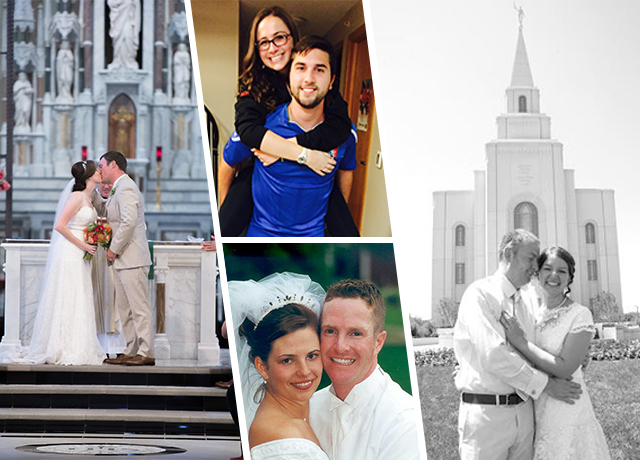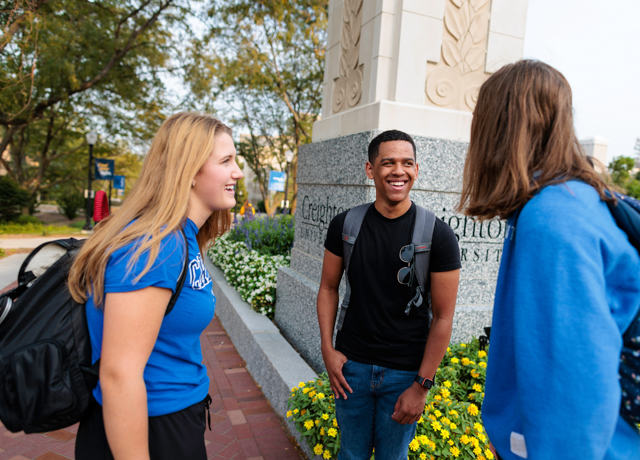Featured Testimonial About Creighton University
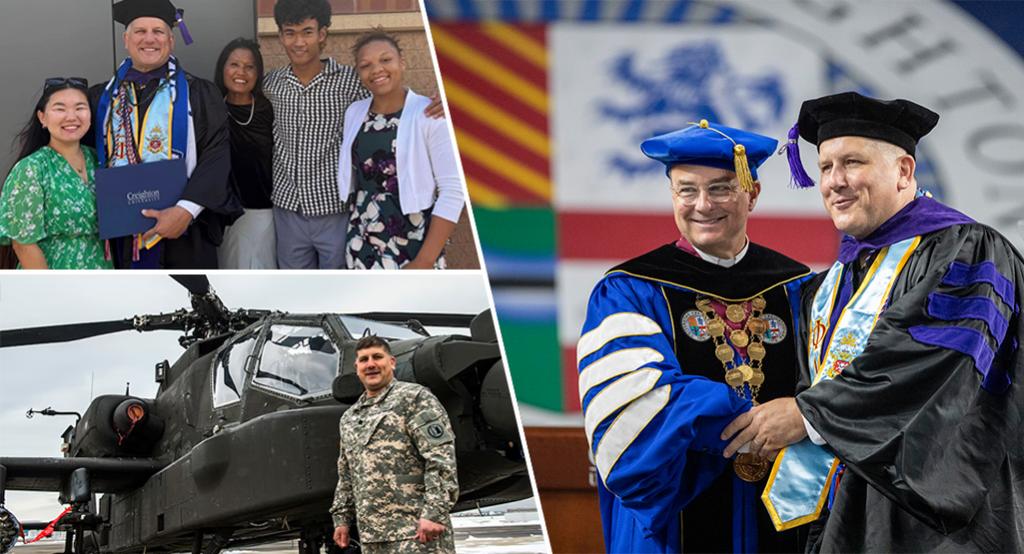
Looking back on the other side of it all now, I see that God’s hand was in this, in my retirement, in bringing us to Creighton.
After 26 years in the U.S. Army, Lt. Col. Matthew Badell — a former Apache helicopter pilot, linguist, interrogator, ROTC commander, mobilization chief, battle captain, and battalion commander — took retirement at 50 years old. Two years later, he landed on his second (or perhaps third, fourth, or fifth) act: moving to Omaha to attend Creighton’s School of Law.
* * *
By Micah Mertes
The rocket attacks started most nights around 2 or 3 a.m.
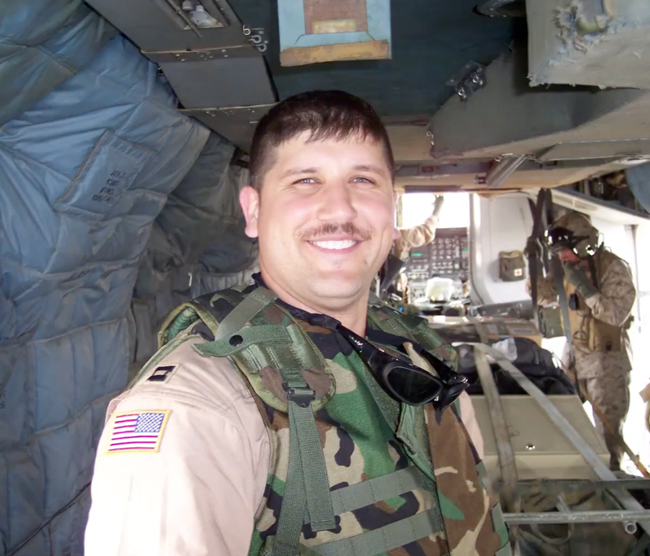
The enemy intended them to destroy or disrupt, and they did just that. Thousands of troops at Bagram Airfield — formerly the largest U.S. military base in Afghanistan — were ripped from their sleep by the booming PA system telling them to throw on their Kevlar helmets and vests and run to the bunkers.
This was the spring of 2004, when Matthew Badell, JD'25, then in his early 30s, was a battle captain of the aviation task force in the Tactical Operations Center. His job was to make sure that every flight mission was successful and included an Apache attack helicopter escort. He helped troops and logistics move throughout the battlespace via air. He ensured that things ran smoothly and searched for solutions when they didn’t.
Badell felt there had to be a way to stop the attacks.
He learned from the military police who ran patrols that they could only cover, at most, a few sectors of the airfield’s perimeter each day, nowhere near the amount of ground needed to stop the attacks.
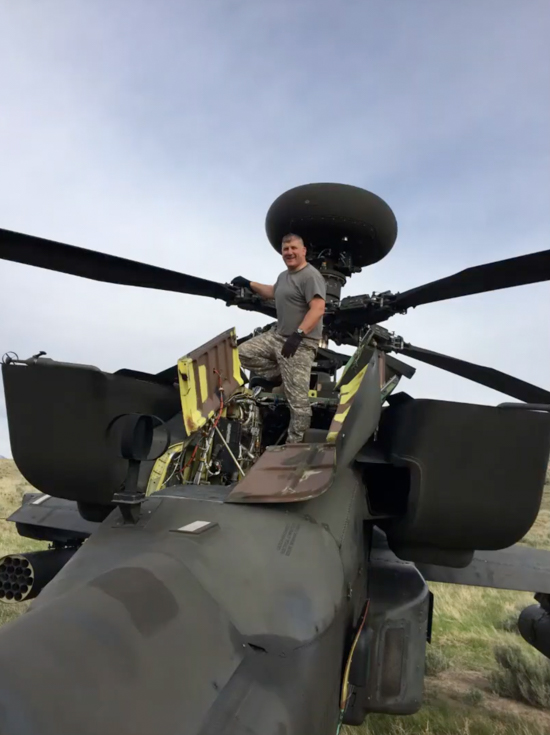
Badell, an Apache helicopter pilot himself, recalled many missions where he would return to base with hours of fuel still in the tank, and he saw an opportunity. He received authorization from command to re-task the Apaches for air surveillance.
“When the pilots were within radio range of base, I’d ask them, ‘What’s your legs? How much fuel do you have?’ And if they were able, I would send them out to help the MPs with their patrol," Badell says. "Having aviation recon allowed them to cover all their sectors.”
The daily rocket attacks stopped. Bagram Airfield slept through the night.
The experience left Badell with at least two major lessons that shaped the next two decades of his life.
1. Leadership is all about relationships. “You have to talk with as many people as you can, and you have to truly listen to them to understand.”
2. “If you’ve still got fuel in the tank, you’ve got to keep flying. You’ve got to go a little more; do a little more. That’s what I’m trying to do now.”
* * *
“If God tells you to go somewhere, be willing. He may give you the answer to ‘why’ only after He’s tested your willingness to go.” — Matthew Badell, JD’25
In 2021, at the age of 50, Lt. Col. Matthew Badell retired after 26 years in the U.S. Army.
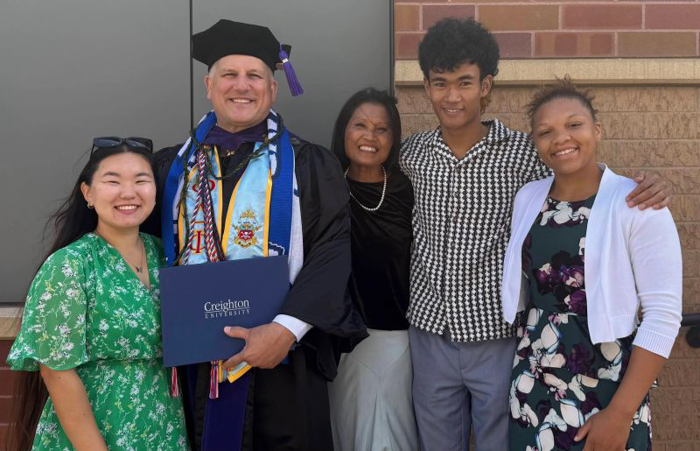
He was probably never going to stay retired for long. He’s too open to discovering new paths, too curious and capable to resist exploring them.
But that still doesn’t explain how a recently retired veteran and father of three living in Provo, Utah, came to move his family to Omaha and enroll in Creighton’s School of Law.
It was, like any major life decision a person makes, the sum of all the circumstances and choices, big and small, that had led to that moment. It can only make sense in context. In other words, it’s kind of a long story.
Badell gave us the abridged version.
He starts in his hometown of Dover, Delaware, where, fresh out of high school, he enlisted as a missionary through the Church of Jesus Christ of Latter-day Saints. He knew other missionaries before him. His brother had been sent to Ecuador, and a friend was dispatched to Chile.
“But I was called to … Fresno, California,” Badell says.
He went there to serve refugees of Southeast Asia, primarily Laotian and Hmong people. He learned Thai and Lao and discovered he had a proficiency in picking up new languages.
After two years of missionary service, Badell got to go where “every LDS kid growing up in Delaware wants to go”: Brigham Young University in Provo, Utah. He started as a pre-med biology major.
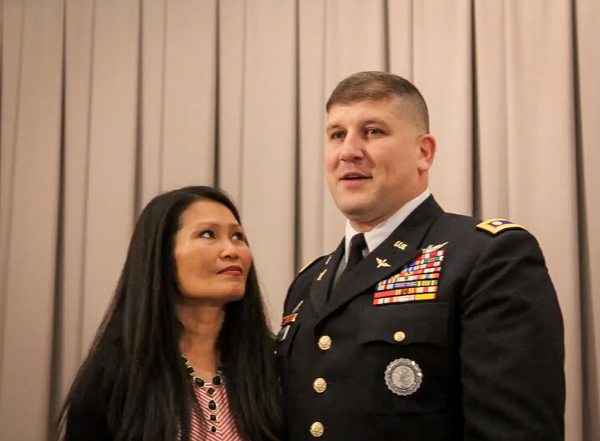
At BYU, Badell joined Friends International, a student association to help retain international students, and he became the group’s designated Asian coordinator. This is why he stopped a Southeast Asian woman at the grocery store one day.
“Are you a BYU student, by chance?” he asked.
“No,” she said, “but my sister is.”
He asked for her sister’s info.
Badell later connected with the woman’s sister, Rose, who was born in Cambodia and partly raised in Thailand. (Today, she is a naturalized U.S. citizen.) He invited her to a few student activities.
Rose initially thought Badell was pulling some kind of bizarre prank on her, and she couldn’t believe that he spoke Thai as well as he did. But she reluctantly accepted his invitation to a group mixer.
“When I saw her there, I asked her to dance,” Badell says. “We’ve been married for 30 years now.”
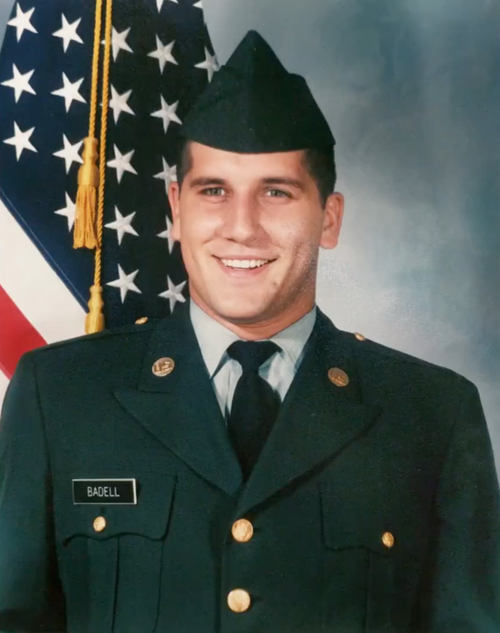
* * *
In November 2003, Matthew and Rose Badell were on their way to spend Thanksgiving with friends and family when Matthew learned he was being activated for duty.
On Dec. 31 of that year, just two days before Matthew was deployed to Afghanistan, he and Rose became new parents. After years of trying to have a child, they were notified that a 5-day-old baby girl from Mongolia was available for adoption. (Twenty-one years later, their daughter Jasmine Badell is a senior at Brigham Young University—Hawaii.)
A few days into his deployment, Matthew’s father passed away. His mother had died the year prior after a long battle with cancer. They were each in their early 60s.
The hardships of losing two parents so young, combined with the weight of becoming a new father himself, made his deployment even more difficult. Away from his new family, he drew from his faith and the friendships he formed.
“I was in Afghanistan with some good men and women,” Badell says. “And when we were there, we weren’t content with only raining hellfire missiles from Apache helicopters. We saw there was a profound need for humanitarian aid, and we wanted to do something.”
After returning to the U.S., Badell and his fellow Apache pilots created a 501(c)(3) called the Afghan Orphan Project to distribute humanitarian assistance in Afghanistan. The nonprofit adopted a village and a few orphanages, and paid for a boy’s heart surgery, a girl’s eye surgery and another girl’s prosthetic leg and college education.
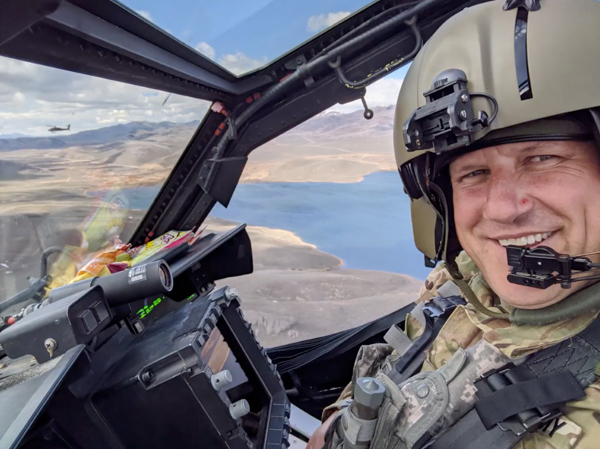
Of all the things he’s been a part of, Badell says, that’s among his proudest.
Badell’s Army career is too extensive to cover in its entirety (see his full CV here), but here’s a rundown:
Basic training in 1995. · Learns Korean to become a linguist and interrogator in the language. · Officer Candidate School. · Trained to fly Apache helicopters. · Flies Apache helicopters in Afghanistan following 9/11. · Battle captain at Bagram Air Base. · Personnel officer and company commander for the 211th Aviation Regiment. · Deputy commander of the recruiting and retention battalion of the Utah National Guard. · Training cadets in the Army ROTC program at Utah State University. · Operations and training officer, battalion commander, Army human resources officer, NATO Info Ops officer, Europe/Africa mobilizations branch chief, and more.
When he retired as a Lt. Col., it was from the Utah National Guard’s Aviation Troop Command.
Along the way, Badell finished his bachelor’s degree at BYU (International Relations – Asian Studies instead of biology), and a master’s degree in leadership from Bellevue University. He worked as the VP of an international language school and, briefly, in market research. He also became a real estate professional and started his own consulting company.
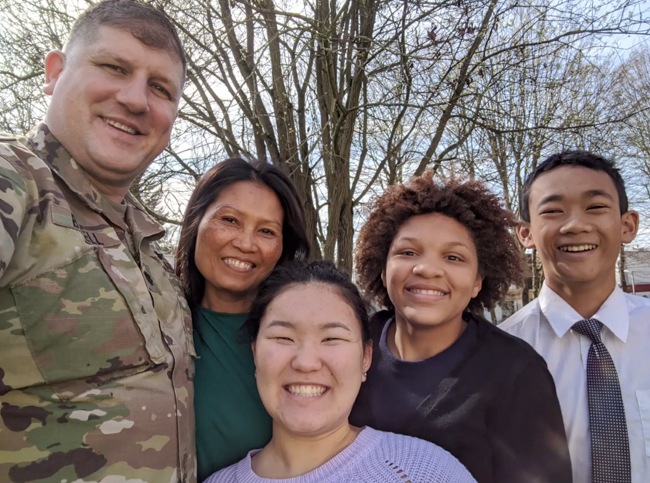
Most importantly, he and Rose have adopted and raised a family of three children.
“Our eldest daughter is Mongolian,” Badell says. “Our son is Cambodian like Rose. Our youngest daughter is biracial. I’m the grandson of Iranian Assyrian immigrants. We’re the international-looking family wherever we go.”
Today, the Badells’ home base is Bellevue, Nebraska.
* * *
Badell stayed busy after retiring from the Army, working as a phlebotomist, substitute teacher and varsity basketball coach.
“Retirement was great,” Badell says. “But after about two years, I went and ruined it.”
His impetus for wanting to become a lawyer begins with his children. The only lawyer he knew was the one who helped him and Rose with their adoption process. In 2021, Badell told him, “I want to be like you. I want to help people put their families together.”
That Brigham Young University was only seven blocks away from Badell’s house in Provo made it the obvious choice for law school. He applied there (and only there) but was waitlisted.
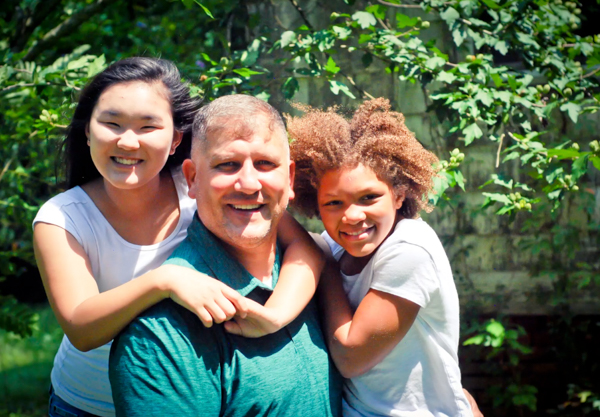
“I thought, well, did I get it wrong about what God wanted for me?” Badell says. “Then I got an email from Creighton.”
Creighton’s School of Law was extending its application deadline by one week. He called the law school’s main line and left a voicemail, asking if they had an option for distance learning. They were not looking to move again.
The next day, Badell received a call from Richard Collin Mangrum, AA and Ethel Yossem Endowed Chair in Legal Ethics in Creighton’s School of Law. Mangrum told him about the GOAL program, a dual accelerated JD and master’s degree in government organization and leadership (GOAL).
Spurred by Mangrum’s encouragement, Badell submitted his lightly altered BYU law application to Creighton and was accepted soon after. At some point in the rush of everything that happened, he typed “Creighton University” into Google Maps.
“Oh, wow, I guess it’s in Omaha, Nebraska.”
Badell moved to Omaha in May 2023, in time for his first day of class. A few months later, he and Rose bought a home in Bellevue, enrolled their two youngest children in Plattsmouth High School and became Nebraskans.
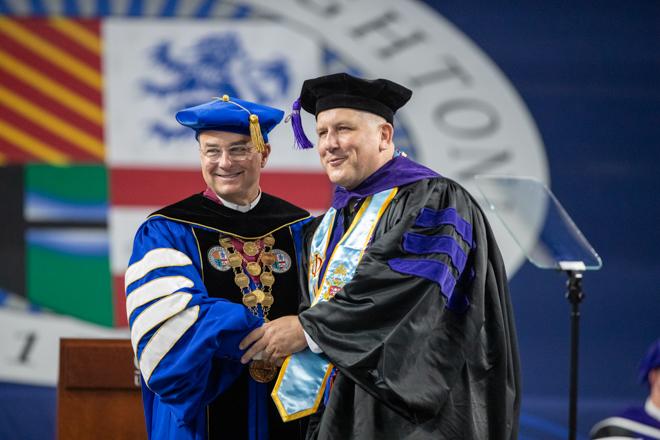
Badell finished law school this past spring. In December, he will complete his master’s in government organization and leadership.
“Looking back on the other side of it all now, I see that God’s hand was in this, in my retirement, in bringing us to Creighton,” Badell says. “Because only Creighton had the GOAL program and the accelerated juris doctorate and N2H … all these things I’ve been able to study and experience.”
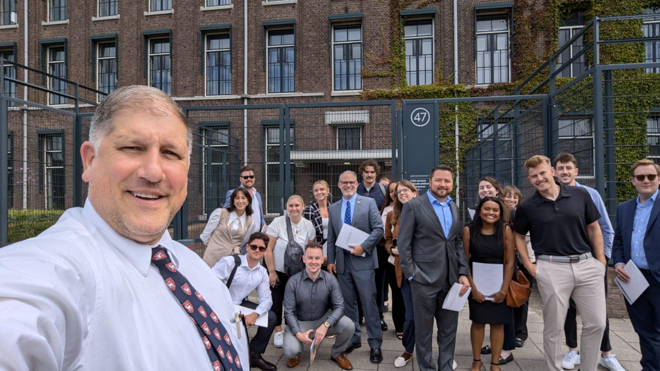
Only Creighton had the Howard A. Kaiman Nuremberg to the Hague program, which allowed Badell and his fellow law students to witness the crime scenes of Holocaust atrocities through a legal lens.
Only Creighton had “Mangrum’s jurisprudence class and Kent Neumeister’s Advanced Constitutional Law and Kristy Cote’s Legal Research and Writing, and Kendra Fershée’s torts class, or Troy Johnson, librarian extraordinaire.”
Only Creighton had “Dean Joshua Fershée sending encouraging messages to all of us as we studied for the bar.”
Only Creighton, Badell says, “as a Jesuit university, would allow me to tell my whole story like you’re letting me tell it now.”
“All of these things combine to make a great experience for anyone who comes to Creighton. So many wonderful things to do and so many wonderful people to learn from. Creighton was the answer to my prayers.”
* * *
Badell will be away from his family until the end of the year, completing a 13-week internship in Washington, D.C., as part of his Creighton master’s program.
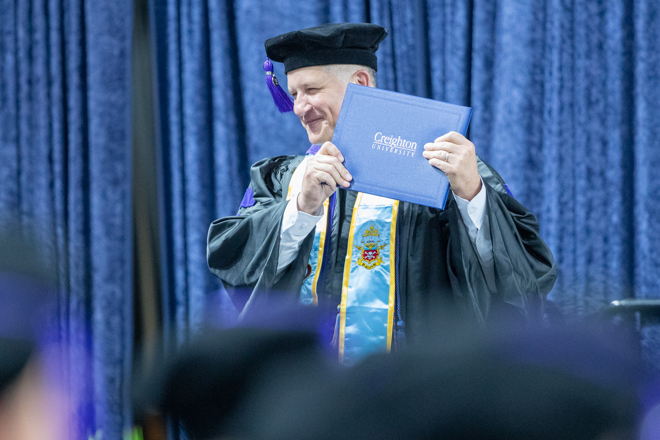
Badell is working in a division of the Department of Homeland Security called the Office of the Principal Legal Advisor. He deals with cases of individuals who have been accused of war crimes or human rights violations in other nations: alleged leaders of death squads, genocide participants, human traffickers, torturers. His job is to help ensure that due process is followed as they are eventually deported to their country of origin to stand trial.
“It’s fascinating work and a good thing to be a part of,” Badell says. “It’s fulfilling to lessen human suffering.”
Is this something he would like to continue after he’s completed his internship? Will he remain in Omaha or move to Washington, D.C., or return to Utah? What comes next?
Badell’s not sure.
“Am I discovering my new life’s calling? I don’t know yet. What I do know is that I’ve still got fuel in the tank, and I’m going to use it for something good.”
